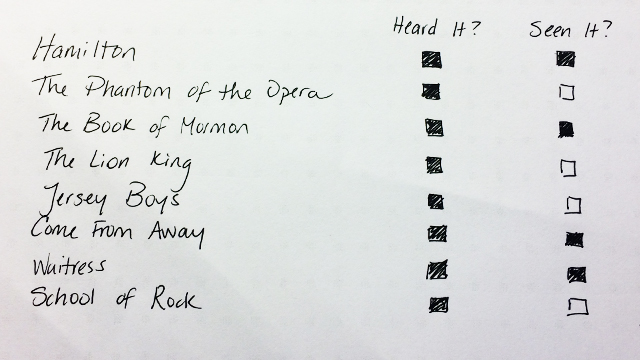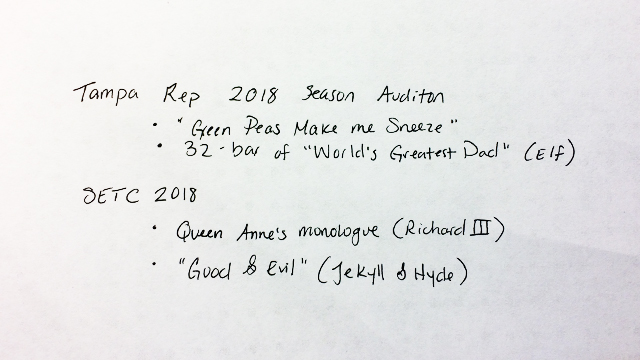6 Helpful Bullet Journaling Tips for Theatre People
Written by Ashleigh Gardner
November 2, 2018
There’s nothing like having all your plans, dreams, and to-dos spread out in front of you in an organized list, right? RIGHT. If you’re looking for a great way to organize your theatre life, bullet journaling is an amazing tool that encourages list-making, tracking, and dream-doing by writing stuff down. The bullet journal system was created by Ryder Carrol in an effort to increase productivity, and left-brained to right-brained people alike have started using the system to get their butts in gear. It allows you to plan for the future and to take stock of what you’ve got going on right now.
Bullet journals use a dot grid system so you can draw straight lines to make charts, tables, and shapes that help you keep track of everything you need or want to remember. They also use a nifty task-labeling system that identifies tasks to complete, events, and appointments. (Take a look at the picture below for an example of how to mark these as completed, in-progress, or moved to a later date.)

1. Keep track of your schedule — rehearsals, performances, classes, etc.

With a bullet journal, you can create and outline your own calendars like the one above. You can start with the whole month with an at-a-glance section, or narrow your calendar down to weeks at a time. (If you prefer to use your phone’s calendar system, go ahead! The great thing about bullet journaling is that it’s unique to every person.) Have a rehearsal at 6pm on Wednesday? Write it down! Have an audition at 7pm on Saturday? Write it down! Need to stop by the store for some throat coat tea? Write. It. Down.
2. Track which plays you want to read.

If you’re an avid reader of plays and you want to keep a running list of which ones you still need to devour, make a nifty list. Then fill in the boxes next to each one when you reach End of play.
3. Record which Broadway musical cast recordings you’ve listened to.

Do you go nuts for original cast recordings? Never forget to listen to the next big Broadway show! Make a list of the ones you’ve listened to so far, and then write down the ones you can’t afford to miss. You can even add another column to indicate if you’ve seen a production of it!
4. Keep a gratitude log.

Let’s face it. Not getting cast in a show you’re dying to do is a bummer. Combat those blues by recording at least 3 things a day you’re grateful for. It’ll help you focus on the good things you’ve got and the exciting goals you have in your future.
5. Record acting classes and their tuition rates.

If you’re looking for a way to record which performance programs are right for you (and how much they’re going to cost in the long run), make a list of the schools and studios you’re interested in applying to/attending along with their dates, application deadlines, and tuition and fee rates. That way you’ll have a clear idea of your goals and how much they’ll cost.
6. Document which monologues and songs you’ve used for which auditions and in what year.

It’s usually not the best idea to use the same monologue for the same theatre or company year after year, so track which monologues and songs you do for who and when.
Need some advice? We’ve got you covered.
- 5 Ways to Say “Thank You” to Your Cast and Crew
- 5 Ways to Take Care of Yourself During Tech Week
- The Room Where It Happens: An Insider’s Guide to the College Audition
- How to Bow (And What Your Bow Says About You)
- 10 Basic Rules of Stage Combat (That Keep Everyone Safe)
- 5 Advantages of Learning Stage Combat
- Don’t Be a Diva: Common Pitfalls and How to Avoid Them
- 9 Articles of Clothing Every Thespian Should Keep In Their Wardrobe
- What Makes an Actor Website WOW?
- “Is my attitude not getting me roles?” And Other Essential Questions for Actors
- 6 Steps to Memorizing Shakespeare
- 10 Tricks to Staying Healthy All Season Long
- What Does It Take to Break Into Voiceovers?
- 5 Tips for Nailing Your College Music Theatre Audition
- 10 Tips on Owning the Room at Competition
- How to Balance Theatre and Coursework
- The 10 Secrets of Great Understudying
- 10 Items Every Actor Should Carry in Their Rehearsal Bag
- 10 Items Every Dancer Should Keep in Their Rehearsal Bag
